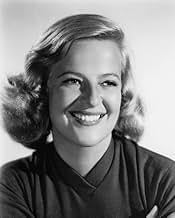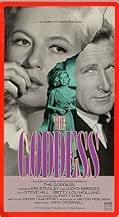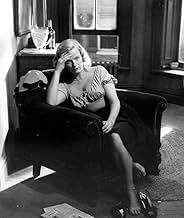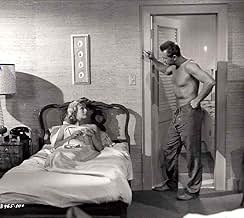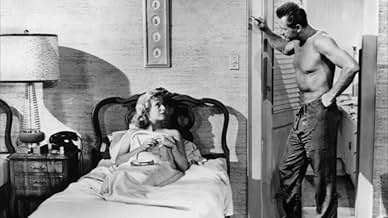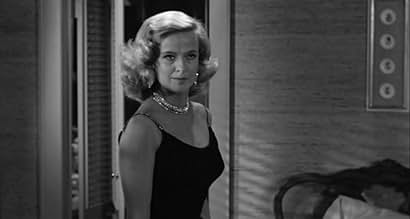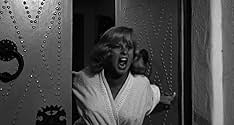AVALIAÇÃO DA IMDb
6,6/10
1,2 mil
SUA AVALIAÇÃO
Adicionar um enredo no seu idiomaA woman adored by the people around her ultimately struggles to be happy with herself.A woman adored by the people around her ultimately struggles to be happy with herself.A woman adored by the people around her ultimately struggles to be happy with herself.
- Indicado a 1 Oscar
- 1 vitória e 1 indicação no total
Steven Hill
- John Tower
- (as Steve Hill)
Margaret Brayton
- Mrs. Woolsy
- (não creditado)
Curt Conway
- The Writer
- (não creditado)
Avaliações em destaque
10qmax
Kim Stanley was the great interpreter of William Inge at the time he was the most successful playwright in America. On Broadway she played Millie, the younger sister, in his "Picnic" and Cheri in "Bus Stop" -- ironically, the role played in the movie by Monroe, the model for "The Goddess." Cast in "The Goddess", Stanley is clearly too old for the part, and not cinematically 'beautiful' enough. What she does bring to the role is an astonishing talent based on flawless technique and an emotional sensitivity that both made her career and destroyed it. I ran across the movie by accident when I was about 12 years old, and Stanley's performance has continued to haunt me for 36 years. The making of "The Goddess" was so emotionally agonizing that Stanley essentially fled from the movie business. How brilliant she would have been in dozens of roles that won acclaim for lesser talents. Many years later she played Jessica Lange's mother in "Frances" -- a similar story of a glamourous and tragic film star. She told Lange, "As soon as this movie's over, do a comedy. Immediately. Any comedy you can get your hands on." That comedy was "Tootsie" which won Lange her first Osacr.
Paddy Chayefsky's "The Goddess" from 1958 stars Kim Stanley, one of the great actresses of our time, as a Marilyn Monroe type, a lonely, unloved girl who finds stardom in Hollywood but ultimately self-destructs. It should be noted that the movie predates Monroe's death by four years.
Chayefsky is responsible for such screenplays as "Network," "The Hospital," "Marty," among others, and, frankly, "The Goddess" is one of his weaker works. There is very little in the way of character development - events happen very quickly, skipping over years, hitting the high points, with very little in between. For instance, Emily Ann (Stanley) talks about her nervous breakdown, but we don't see it. She makes reference to past promiscuity while talking to her second husband (Lloyd Bridges), but all we see is an invitation by a studio head to come to his house.
The film is notable for the tour de force performance by Stanley who, despite the gaps in the story, creates a vivid characterization of a desperate, ambitious, easily influenced woman looking for someone to love her. Stanley absorbs all of Emily Ann's changes of mood as well as her temperament. When Emily Ann is recently home from the sanitarium, she receives a visit from a director (Werner Klemperer) and his wife. She's hyperkinetic, a ticking bomb; the next time we see them visit, she's found Jesus and acts calm and centered. One can see here that she must have been a magnificent Blanche DuBois, a role she performed early in her career.
"The Goddess" seems to have been made on a tight budget; it certainly doesn't look like a glossy Hollywood film. Stanley was 40 when she made it, and her role begins when the character is 19. There's no attempt anywhere in the film to make her look younger or like a starlet or a movie star. Yet she makes you believe the whole thing.
It's a pity Stanley didn't make more films, but "The Goddess" gives us an excellent idea of Kim Stanley's magnificence as an actress.
Chayefsky is responsible for such screenplays as "Network," "The Hospital," "Marty," among others, and, frankly, "The Goddess" is one of his weaker works. There is very little in the way of character development - events happen very quickly, skipping over years, hitting the high points, with very little in between. For instance, Emily Ann (Stanley) talks about her nervous breakdown, but we don't see it. She makes reference to past promiscuity while talking to her second husband (Lloyd Bridges), but all we see is an invitation by a studio head to come to his house.
The film is notable for the tour de force performance by Stanley who, despite the gaps in the story, creates a vivid characterization of a desperate, ambitious, easily influenced woman looking for someone to love her. Stanley absorbs all of Emily Ann's changes of mood as well as her temperament. When Emily Ann is recently home from the sanitarium, she receives a visit from a director (Werner Klemperer) and his wife. She's hyperkinetic, a ticking bomb; the next time we see them visit, she's found Jesus and acts calm and centered. One can see here that she must have been a magnificent Blanche DuBois, a role she performed early in her career.
"The Goddess" seems to have been made on a tight budget; it certainly doesn't look like a glossy Hollywood film. Stanley was 40 when she made it, and her role begins when the character is 19. There's no attempt anywhere in the film to make her look younger or like a starlet or a movie star. Yet she makes you believe the whole thing.
It's a pity Stanley didn't make more films, but "The Goddess" gives us an excellent idea of Kim Stanley's magnificence as an actress.
"There ain't no God! Do you hear me? There ain't no God!"
Screenwriter Paddy Chayefsky traces the arc of celebrity from troubled childhood, never feeling loved, being used by men, and the feeling of loneliness despite fame. He channels Tennessee Williams early on especially, with a poor teenage mother in the South dumping off her child with her brother so she's not tied down. The child grows up and searching for a connection, becomes sexually promiscuous, and marries a man who gives her an inroad into Hollywood. He's got problems of his own, and he sardonically summarizes their relationship by saying "You have a passion for respectability, I have a horror of loneliness - that's love." She leaves him and her child, ironically parroting the sentiments of her mother.
The woman (Kim Stanley) achieves fame after a second marriage to an athlete (Lloyd Bridges), posing nude and makes herself physically available to powerful men in Hollywood. All of that is just alluded to which is understandable, but it was frustrating that the rest of the woman's professional life was also described at a distance, and never shown. The result was a film that wallowed in overwrought speeches and was emotionally one-sided as it played out. Kim Stanley is the main reason to see it despite a script that languishes, and she has some fine "method" moments, especially in the charged scenes with her mother (Betty Lou Holland). Unfortunately, she's far less successful playing a teenager, not acting or looking the part in the slightest. Overall though, this is just not a strong enough vehicle for her, as interesting as she was. Terrible ending too.
Screenwriter Paddy Chayefsky traces the arc of celebrity from troubled childhood, never feeling loved, being used by men, and the feeling of loneliness despite fame. He channels Tennessee Williams early on especially, with a poor teenage mother in the South dumping off her child with her brother so she's not tied down. The child grows up and searching for a connection, becomes sexually promiscuous, and marries a man who gives her an inroad into Hollywood. He's got problems of his own, and he sardonically summarizes their relationship by saying "You have a passion for respectability, I have a horror of loneliness - that's love." She leaves him and her child, ironically parroting the sentiments of her mother.
The woman (Kim Stanley) achieves fame after a second marriage to an athlete (Lloyd Bridges), posing nude and makes herself physically available to powerful men in Hollywood. All of that is just alluded to which is understandable, but it was frustrating that the rest of the woman's professional life was also described at a distance, and never shown. The result was a film that wallowed in overwrought speeches and was emotionally one-sided as it played out. Kim Stanley is the main reason to see it despite a script that languishes, and she has some fine "method" moments, especially in the charged scenes with her mother (Betty Lou Holland). Unfortunately, she's far less successful playing a teenager, not acting or looking the part in the slightest. Overall though, this is just not a strong enough vehicle for her, as interesting as she was. Terrible ending too.
I recently caught this movie on TCM and loved every second of it. Kim's accent gets a bit tiresome but the overall effect is great. Love the scene in which Patty Duke, playing The Goddess as a neglected child, pathetically tells her cat that she got promoted to the next grade in school. This movie contains all of the tried and true "money and fame aren't everything" requisites. I wish Kim Stanley had tried her hand at Tennessee Williams. She has that "Geraldine Page" affectation that Mr. Williams apparently appreciated. I remember her from "Frances". It's too bad she didn't do more movies. The Goddess is a wonderful look at late 50s Hollywood and the inherent danger in getting what you've always wanted.
I saw this film a long time ago in New york and have wanted to see it again ever since. I remember that Kim Stanley was, maybe, the most astounding actress I've ever seen. She had depth few actress' possess now days. Only Meryl Streep comes close. It's worth it just to see, what many of the inner circle of the New York Broadway group of the time called Americas greatest actress, do her thing.
Você sabia?
- CuriosidadesJoan Copeland, who played Alice Marie in the movie, was the sister of playwright Arthur Miller. This made her, at that time, the sister-in-law of Marilyn Monroe, whose life was ostensibly the basis for the story.
- Erros de gravaçãoEmily claims that Stage Door, a play she appeared in during high school, was written by Moss Hart and George S. Kaufman; in reality it was written by Kaufman and Edna Ferber.
- Citações
Lester Brackman: Well, she's got something, Dutch. She's very good in this picture. She's going to attract a lot of attention. She's got what I call the quality of availability.
- ConexõesFeatured in Precious Images (1986)
Principais escolhas
Faça login para avaliar e ver a lista de recomendações personalizadas
- How long is The Goddess?Fornecido pela Alexa
Detalhes
Bilheteria
- Orçamento
- US$ 550.000 (estimativa)
- Tempo de duração1 hora 44 minutos
- Cor
- Proporção
- 1.85 : 1
Contribua para esta página
Sugerir uma alteração ou adicionar conteúdo ausente



